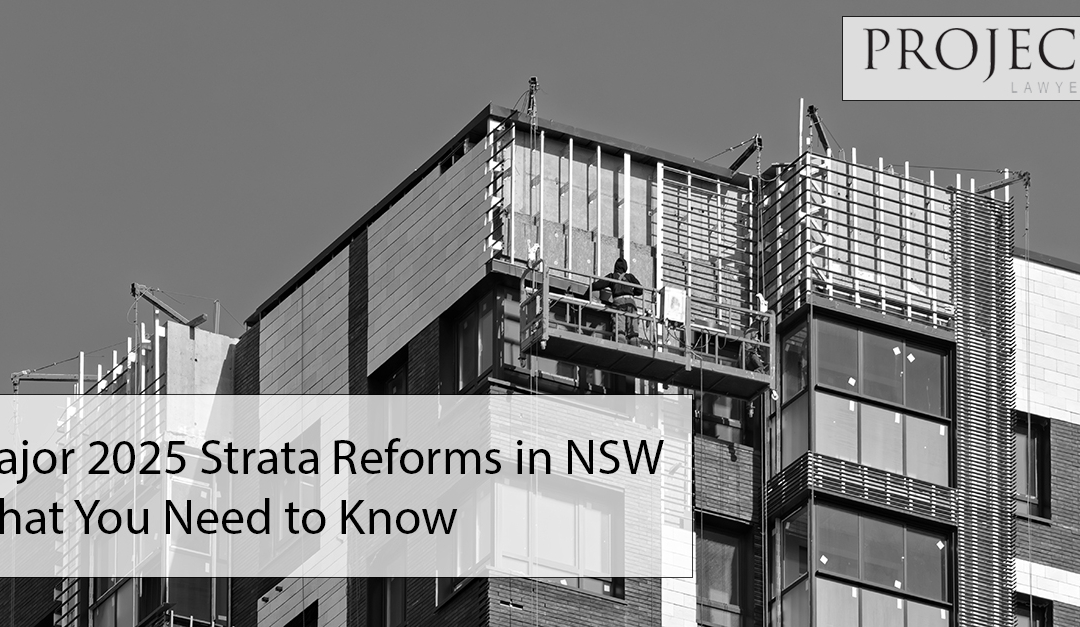Strata living has established its importance as a fundamental component of the State’s housing system, with over 87,000 strata schemes, and approximately half of the State estimated to be living in strata communities by 2040. Given the prevalence of strata living in New South Wales, maintaining and ensuring the efficiency of the strata system is an inherent duty of the State’s legislative powers.
Recognising this growing importance, the NSW Government has introduced the Strata Schemes Legislation Amendment Act 2025 (NSW) (SSLAA). This Act implements key reforms designed to improve transparency, accountability, and governance across the strata sector.
The SSLAA follows the 2021 Statutory Review of the Strata Schemes Management Act 2015 (SSMA) and Strata Schemes Development Act 2015 (SSDA), which made 139 recommendations for reform. The 2025 amendments implement 37 of these, with the stated aim of “protect[ing] owners’ corporations, improve the accountability of strata management services, ensure owners’ corporations maintain their buildings and make strata living easier for residents”.
What are the Changes?
The SSLAA implements a number of changes to both the SSMA, the Community Land Management Act 2021, and a series of consequential changes to other statutes.
While there are a number of changes affecting accessibility considerations, minor renovations levy payments, by-law consent and obtaining legal services, the key reforms to the SSMA are as follows:
- Stricter duties on strata and building managers, including:
- Increasing the maximum penalty, and inserting ongoing offences for failure to convene a strata scheme’s first annual general meeting (AGM) within 2 months of the initial period and failure to deliver particular documents to the owners corporation (OC) at least 14 days prior to the first AGM;
- Introducing a requirement for strata managers to provide records regarding the exercise of their functions of the OC or officers of the OC to the OC every six months; and
- Introducing a duty for building managers to act in the best interests of the OC.
- Imposing a mandatory training requirement on strata committee members, alongside expanded duties and obligations.
- Amendments to the provisions on payment plans and unpaid contributions.
- Amending the section 106 duty to:
- Allow the OC to defer their compliance with the section 106 duty to repair and maintain common property until after action is taken against an owner in relation to the damage if the deferment will not have adverse safety effects or prevent the person from accessing the lot or common property; and
- Extending the statute of limitations for bringing action against an owner for breach of section 106 from two years to six years.
- Inserting additional powers to allow for the investigation, monitoring and enforcement of compliance with the section 106 duty by the Secretary.
When do the Changes Come into Effect?
This legislation has come into effect gradually across the second half 2025, and will continue to have changes commencing into early 2026.
From 1 July 2025 to 27 October 2025, Key provisions commenced, including those relating to strata committee duties, by-law consent, payment plans, building manager obligations, and section 106 changes.
A new wave of changes is set to come into effect on 1 April 2026, including changes to initial maintenance schedules, new evidence obligations, and details of exclusive supply to be included in strata information certificates, ensuring sufficient time to comply with new obligations under the SSLAA.
What Do These Changes Mean for You?
Lot Owners
Lot owners stand to benefit from stronger governance and greater accountability. With enhanced duties for strata committees and building managers, owners should experience improved communication, transparency in decision-making, and better maintenance outcomes. The extended limitation period under section 106 also strengthens owners’ rights to pursue claims for failure to repair common property.
Strata and Building Managers
The reforms increase professional accountability. Managers will need to ensure timely compliance with meeting and reporting obligations, maintain detailed records, and act strictly in the best interests of the owners corporation. The introduction of mandatory reporting and new penalties signals a shift towards more rigorous oversight.
Developers
Developers must remain mindful of transitional obligations, particularly those concerning handover documentation and the timing of the first AGM. The heightened penalties for early non-compliance are intended to ensure a smoother transition from development to occupation.
Builders and Contractors
Although the amendments primarily target governance and management, builders are indirectly affected through the expanded section 106 regime. Owners corporations are likely to act more promptly on maintenance issues and enforcement, which may increase scrutiny of post-completion defect rectification.
How Project Lawyers Can Help
Project Lawyers advises owners corporations, strata committees, developers, and strata managers on all aspects of strata governance and compliance. Our team can assist you in:
- Reviewing your by-laws and management agreements for compliance with the new legislation;
- Advising on section 106 obligations and potential exposure;
- Updating internal policies and committee procedures; and
- Providing training and guidance for strata committee members.
If you have any questions, please feel free to contact Maysaa Parrino or Alex Ostermayer via email (maysaa@projectlawyers.com.au / alex@projectlawyers.com.au) or via telephone on (02) 9025 0808.
The contents of this publication are for reference purposes only. This publication does not constitute legal advice and should not be relied upon as legal advice. Specific legal advice should always be sought separately before taking any action based on this publication.
Liability limited by a scheme approved under Professional Standards Legislation.
Author: Maysaa Parrino & Alex Ostermayer


